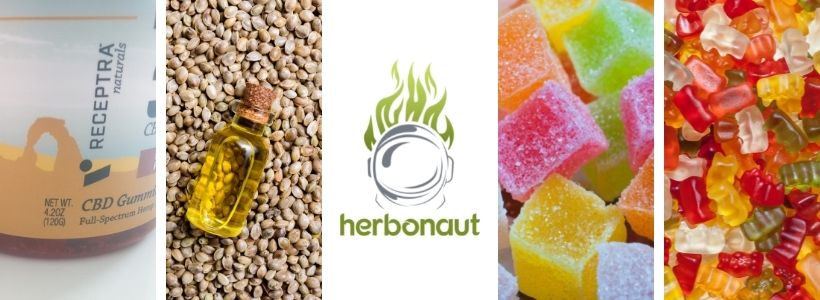
CBD gummies are usually infused with hemp extract. But are hemp gummies the same as CBD gummies?
Well, they don’t have to be.
Hemp gummies can refer to various different products, one of them being CBD gummies. But it can also refer to other types of products.
And some ‘hemp gummies’ don’t contain any CBD or other cannabinoids.
For example:
Some hemp gummies only contain hempseed oil.
Hempseed oil doesn’t have any cannabinoids like CBD in meaningful concentrations.
When you want to try cannabinoids like CBD, the last thing you want is buy hempseed gummies.
After reading today’s post you’ll exactly understand what you’re buying when you buy any product with ‘hemp’ or ‘CBD’ inside the name.
Let’s get started.
Table of Contents
What Are CBD Gummies?
Most CBD gummies are gummy candy infused with hemp extract.
This hemp extract can come in three different types:
- full-spectrum hemp extract,
- broad-spectrum hemp extract, and,
- isolate hemp extract.
Full-spectrum CBD gummies contain a wide variety of cannabinoids like CBD, THC (less than 0.3%), CBC, CBN. They can also contain terpenes from the hemp plant.
Broad-spectrum CBD gummies also contain a variety of cannabinoids, but are always free from THC.
Isolate CBD gummies only contain CBD. No other cannabinoids, and no terpenes.
Like regular gummy candy, CBD gummies come in a variety of flavors.
CBD gummies are also available in different shapes and colors. Some companies provide CBD gummies in the shape of gummy bears. Typically, these gummies are available in cube shapes, and some companies offer multiple flavors in one bottle.
As explained, full-spectrum CBD gummies can contain up to 0.3% THC. And while this seems like a low amount, because CBD gummies are much less concentrated than oil, 0.3% can add up to multiple milligrams.
So to determine whether a particular brand of CBD gummies will make you high or give you a buzz, it’s important to determine how many milligrams THC you’re ingesting.
Example with certificate of analysis:
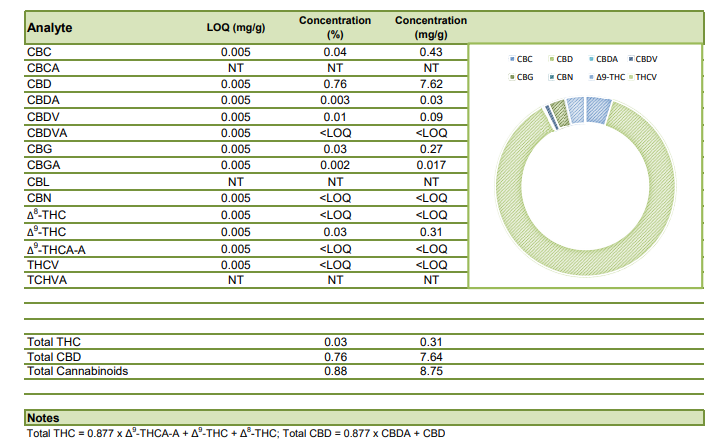
If the manufacturer didn’t disclose how much THC you ingest per gummy, you have to calculate it yourself.
You can calculate this by determining the CBD-to-THC ratio.
You calculate this by dividing the CBD-percentage with the THC-percentage:
0.76 / 0.03 = 25.
The CBD-to-THC-ratio is 25:1.
So for every 25mg CBD, you ingest 1 mg THC.
The manufacturer always discloses how much CBD you ingest per gummy.
Let’s assume a gummy of this product has 25mg CBD.
This means you ingest 1mg THC per gummy.
If you would take a dose of 100mg CBD, you would need 4 gummies.
4 gummies would equal 4mg THC.
While 4mg THC isn’t enough to experience a full-fledged high, it’s enough for some to experience a buzz. Or even side effects associated with THC, like anxiety or paranoia.
Also keep in mind:
While CBD doesn’t make you high, it can alter how you feel. How? By relieving anxiety and stress. CBD can make you feel more relaxed, but it shouldn’t impair your cognition. If after taking CBD gummies you experience impaired cognition, know that it’s most probably caused by THC.
Benefits of CBD Gummies
CBD gummies may offer various health benefits. Some of them can improve your quality of life.
The benefits of CBD gummies are related to the benefits associated with CBD, and to a lesser extent, the benefits associated with minor cannabinoids like THC, CBC, CBG, and CBN.
May Help Relieve Anxiety and Depression: CBD can help alleviate depression by altering the serotonin levels in your brain (1). The same mechanism is thought to be responsible for CBD ‘s anxiety-reducing effects,.
Just keep in mind that if you have full-spectrum CBD gummies and ingest more than 2 milligrams THC, you risk worsening your anxiety.
Pain Relief: CBD and most other cannabinoids have potent anti-inflammatory effects. Research shows that CBD may relieve inflammatory-related pain conditions. CBD interacts with various receptor systems including the endocannabinoid system, vanilloid receptors, glycerin receptors, and more. For a detailed explanation on the the potential pain-relieving properties of CBD, click here.
Can Help People Quit Nicotine and Other Drugs: Studies show that CBD can interfere with addiction-related neural pathways in the brain (2). This means CBD may help you quit addictive substances like nicotine, and alcohol. CBD itself isn’t physically addictive. But you could get psychologically addicted to the relieving properties of CBD.
CBD has been associated with many more benefits mostly related to symptom relief.
There isn’t much, if any, clinical proof that CBD can cure medical conditions.
Click here if you want to learn more about the benefits of CBD.
What Are Hemp Gummies?
First, it’s important to understand that ‘hemp gummies’ can refer to:
- CBD gummies, or,
- hempseed oil gummies.
The only way to know what type of product you have, is by checking whether the product contains cannabinoids like CBD.
Either it’s clearly stated on the product like:
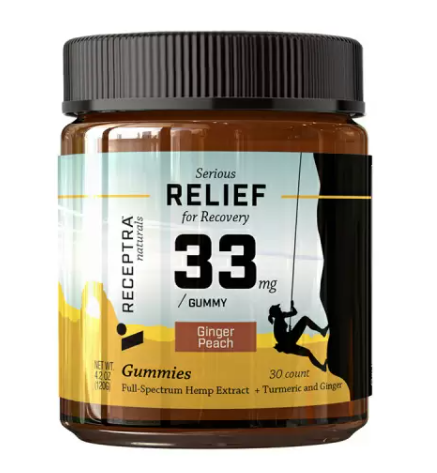
With these gummies, you can clearly see you get 33mg CBD per gummy.
Or you have a lab analysis report like:
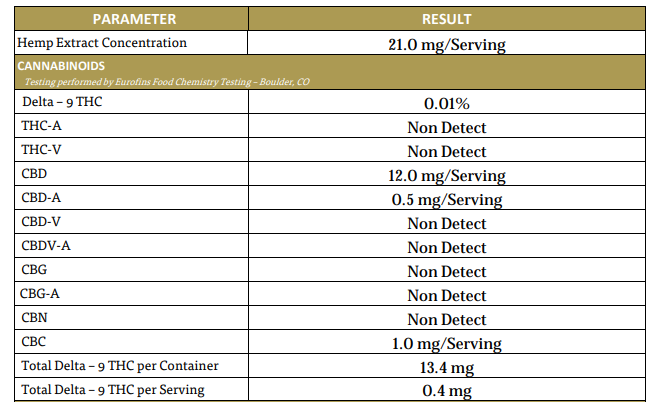
Here you can clearly see you get 12mg CBD per gummy.
Actually, if you don’t have a lab-analysis report, you never exactly know what it is you’re taking.
My recommendations: avoid any ‘hemp’ or ‘CBD’ product if it doesn’t have a lab analysis report.
Hempseed oil gummies don’t contain any cannabinoids.
A lab-analysis report of hempseed oil never shows any cannabinoids like CBD.
So if you don’t clearly see that your product contains CBD, preferably in a lab-analysis report, it’s safe to assume that you DON’T have a CBD product. But a hempseed oil product.
The label ‘hemp gummies’ is used as a synonym for CBD gummies. But more often, the label ‘hemp gummies’ is used for a product that contains hempseed oil.
CBD gummies or ‘hemp gummies’ that refer to gummy candy infused with hemp extract, are infused with an extract that comes from hemp plants. ‘Hemp gummies’ that refer to gummy candy infused with hempseed oil, are produced with an extract that comes from hemp seeds.
Hemp plants and hemp seeds have a totally different chemical profile.
Hempseed oil products like hemp(seed oil) gummies usually don’t come with a certificate of analysis.
But you can usually clearly see on the packaging what compounds they advertise with.
For example these gummies found on Amazon advertise with omega fatty acids and vitamins:
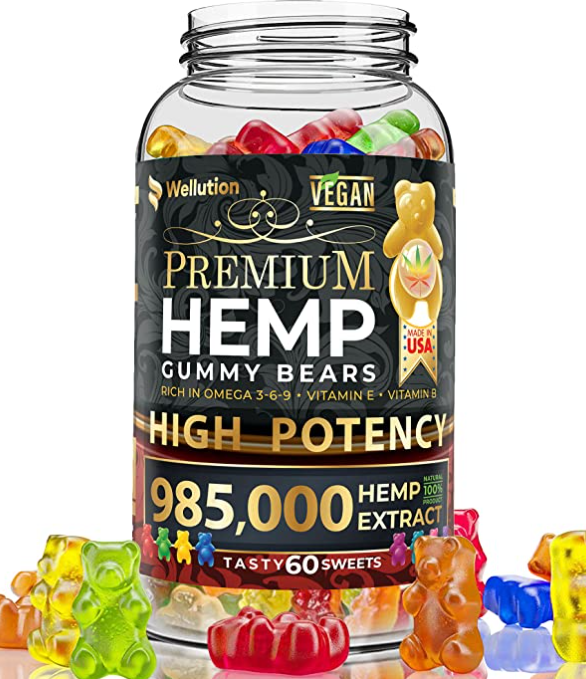
The selling point isn’t CBD or any other cannabinoids.
Also, when you check a certificate of analysis from a hempseed oil product, it will show fatty acid profile, but won’t show any cannabinoids:
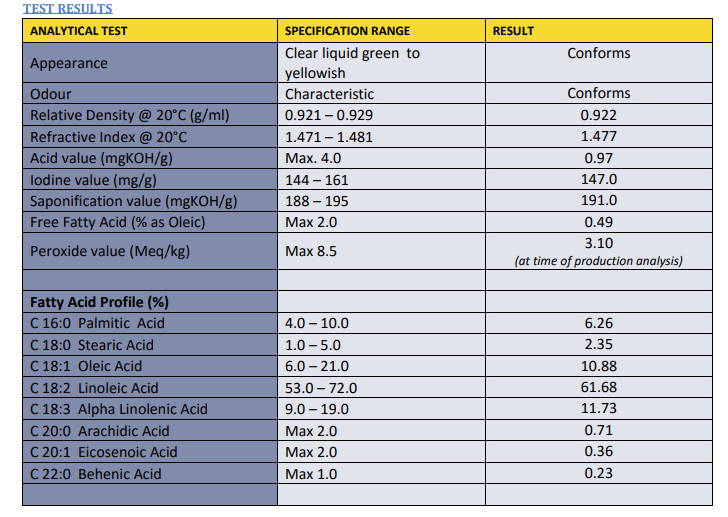
The main difference is that cannabinoids like CBD can only be found in hemp plants. Not in hemp seeds.
So, what are the benefits of hemp(seed oil) gummies, if they don’t have THC or CBD?
Hempseed oil contains many essential fatty acids, vitamins, and minerals.
Most benefits associated with hempseed oil are related to the benefits of essential fatty acids like linolenic acid and alpha-linolenic acid.
Studies show that linolenic acid and alpha-linolenic acid may have benefits for skin and cardiovascular health (3, 4).
But these essential fatty acids can be found in fish oil or olive oil as well, for example.
Cannabinoids are unique, have unique benefits, and can only be found in hemp plants.
So if you want to experience the benefits of CBD, it’s essential you get CBD gummies.
Hempseed oil gummies don’t contain any CBD.
Benefits of Hempseed Oil Gummies
The benefits of hempseed oil gummies are related to the benefits of various beneficial compounds inside hempseed oil.
The main beneficial compounds inside hempseed oil are:
- polyunsaturated fatty acids,
- essential fatty acids, like omega-3 fatty acids, specifically alpha-linolenic, and linolenic fatty acids,
- plant sterols,
- tocopherols,
Omega-3 fatty acids:
consumption of these fatty acids is associated with a list of health benefits including:
- benefits for heart health,
- benefits for brain health,
- benefits for skin health.
Plant sterols:
these compounds can aid cardiovascular health by reducing ‘bad’ cholesterol levels (LDL) and total cholesterol levels.
Tocopherols: these are various forms of vitamin E. Vitamin E has been associated with a wide variety of benefits, including:
- potent antioxidant activity,
- reduce risk of chronic conditions like cancer and heart disease,
- reduce risk of obesity.
Similarities Between Hemp(seed oil) Gummies and CBD Gummies
Hempseed products and cannabinoid products like CBD gummies do have some benefits that overlap.
Just keep in mind that cannabinoids are unique and there are no compounds inside hempseed that produce the benefits the same way as cannabinoids.
Both May Help Relieve Pain
Both CBD gummies and hempseed oil gummies can relieve pain.
Cannabinoids like CBD and THC have potent anti-inflammatory effects. But so do omega-3 fatty acids found in hempseed oil.
Cannabinoids and omega-3 fatty acids can both be helpful in relieving pain. How they relieve pain is very different though.
Omega-3 fatty acids inhibit an enzyme called cyclooxygenase (COX). This enzyme produces the prostaglandin hormones associated with inflammation.
CBD’s anti-inflammatory effect is quite complex.
CBD interacts directly or indirectly with various receptor systems that play a role in inflammation:
- CB1 and CB2 receptors;
- Glycerine receptors;
- Opioid receptors;
- Serotonin receptors;
- Adenosine receptors, and;
- TRPV1 receptors.
By combining CBD gummies with hempseed oil gummies, you may possibly improve your chance to relieve pain even further.
Promotes Heart Health
Both cannabinoids found in CBD gummies and compounds found in hempseed oil gummies can help improve heart health.
Cannabinoids may improve heart health through their anti-inflammatory effects and their action on blood pressure. CBD has been shown to reduce blood pressure in specific circumstances like anticipation of stress (5).
Hempseed oil gummies have various compounds that may help improve heart health. Omega-3 fatty acids improve health heart by:
- reducing blood triglyceride levels, triglycerides can clog up your arteries and heighten the risk for heart events like heart attacks and strokes,
- increase high-density lipoprotein also called ‘good cholesterol’) levels,
- decrease platelet aggregation (clotted blood cells).
Plant sterols, found in hempseed oil products, may improve heart health by reducing ‘bad’ cholesterol levels ‘LDL’.
Can Help Reduce Anxiety
Various animal and human studies show that CBD has potent anxiety-reducing effects (6).
But most people don’t know that omega-3 fatty acids found in hempseed oil gummies can have anxiety-reducing effects as well. Studies have shown that omega-3 fatty acids help alleviate anxiety in healthy adults (7).
Just keep in mind that CBD gummies can contain THC. While THC in low doses can help reduce anxiety, in high doses, THC can worsen anxiety. Always make sure if and how much THC you ingest when taking CBD gummies.
Differences Between CBD and Hemp(seed oil) Gummies
Now that you’re clear on the similarities between these two types of gummies let’s check out their differences.
Cannabinoids vs no cannabinoids
CBD gummies contain cannabinoids, and hempseed oil gummies don’t.
If you’re looking for the benefits of CBD, hempseed oil gummies won’t give you any. Hempseed oil gummies don’t contain cannabinoids like CBD in meaningful concentrations.
Cannabinoids are a unique category of compounds only found in cannabis plants. But the compounds found in hempseed oil can also be gotten from other sources.
For example:
Fish oil also has a lot of the same beneficial fatty acids found in hempseed oil.
The beneficial compounds in hempseed oil aren’t (for the most part) unique to hempseed oil.
But cannabinoids are unique and they can only be found in cannabinoid products like CBD gummies.
Price Difference
CBD gummies are relatively expensive since both the source material and the methods used to produce them are costly.
Hempseed is significantly more affordable than hemp flower. In most cases, hemp flower is what’s the basis for CBD gummies. Sometimes it’s hemp ‘biomass’. But this biomass consists mostly of plant material.
Hempseeds are the basis for hempseed oil products. Hempseeds are way more affordable than hemp plants.
Hempseed oil products are manufactured through cold-pressing.
Most CBD products are manufactured with CO-2extraction or cold-ethanol extraction. Both these production methods are significantly more expensive than cold pressing.
And this difference in production costs, you’ll see reflected in price of CBD gummies vs hemp(seed oil) gummies.
Still, CBD gummies don’t have to be that expensive. You can find options that will only set you back for around $2 per day.
Health Benefits
Cannabinoids like CBD offer more unique health benefits than the compounds found in hempseed oil products.
As explained, cannabinoids are a unique category of compounds only found in cannabis plants.
For example:
The benefits associated with compounds found inside hempseed oil can also be obtained by taking products like fish oil.
Availability
As mentioned before, CBD gummies are a lot more popular than hemp gummies. Because of this, CBD gummies are a lot more available online than hemp(seed oil) gummies. Conversely, CBD gummies are still illegal in a few states but hemp(seed oil) gummies can be sold legally in physical stores.
Conclusion
Hemp gummies is a label sometimes referring to cannabinoid products like CBD gummies. And other times referring to gummies infused with hempseed oil.
While both of these products can have some benefits, gummies infused with hempseed oil don’t contain cannabinoids in meaningful concentrations.
If you want to get the benefits of cannabinoids like CBD, you need gummies that contain these in meaningful concentrations.
And the only way to truly know whether a product has cannabinoids, is by checking its certificate of analysis.
What’s Next…
Go to our CBD Hub to learn more about CBD-related topics.
Scientific Sources:
- Silote, G. P., Sartim, A., Sales, A., Eskelund, A., Guimarães, F., Wegener, G., & Joca, S. (2019). Emerging evidence for the antidepressant effect of cannabidiol and the underlying molecular mechanisms. Journal of Chemical Neuroanatomy, 98, 104–116. https://doi.org/10.1016/j.jchemneu.2019.04.006
- Hurd, Y. L., Spriggs, S., Alishayev, J., Winkel, G., Gurgov, K., Kudrich, C., Oprescu, A. M., & Salsitz, E. (2019). Cannabidiol for the Reduction of Cue-Induced Craving and Anxiety in Drug-Abstinent Individuals With Heroin Use Disorder: A Double-Blind Randomized Placebo-Controlled Trial. American Journal of Psychiatry, 176(11), 911–922. https://doi.org/10.1176/appi.ajp.2019.18101191
- Miura, K., Way, M., Jiyad, Z., Marquart, L., Plasmeijer, E. I., Campbell, S., Isbel, N., Fawcett, J., Ferguson, L. E., Davis, M., Whiteman, D. C., Soyer, H. P., O’Rourke, P., & Green, A. C. (2020). Omega-3 fatty acid intake and decreased risk of skin cancer in organ transplant recipients. European Journal of Nutrition, 60(4), 1897–1905. https://doi.org/10.1007/s00394-020-02378-y
- Geleijnse, J. M., de Goede, J., & Brouwer, I. A. (2010). Alpha-Linolenic Acid: Is It Essential to Cardiovascular Health? Current Atherosclerosis Reports, 12(6), 359–367. https://doi.org/10.1007/s11883-010-0137-0
- Jadoon, K. A., Tan, G. D., & O’Sullivan, S. E. (2017b). A single dose of cannabidiol reduces blood pressure in healthy volunteers in a randomized crossover study. JCI Insight, 2(12). https://doi.org/10.1172/jci.insight.93760
- Skelley, J. W., Deas, C. M., Curren, Z., & Ennis, J. (2020). Use of cannabidiol in anxiety and anxiety-related disorders. Journal of the American Pharmacists Association, 60(1), 253–261. https://doi.org/10.1016/j.japh.2019.11.008
- Su, K. P., Tseng, P. T., Lin, P. Y., Okubo, R., Chen, T. Y., Chen, Y. W., & Matsuoka, Y. J. (2018). Association of Use of Omega-3 Polyunsaturated Fatty Acids With Changes in Severity of Anxiety Symptoms. JAMA Network Open, 1(5), e182327. https://doi.org/10.1001/jamanetworkopen.2018.2327